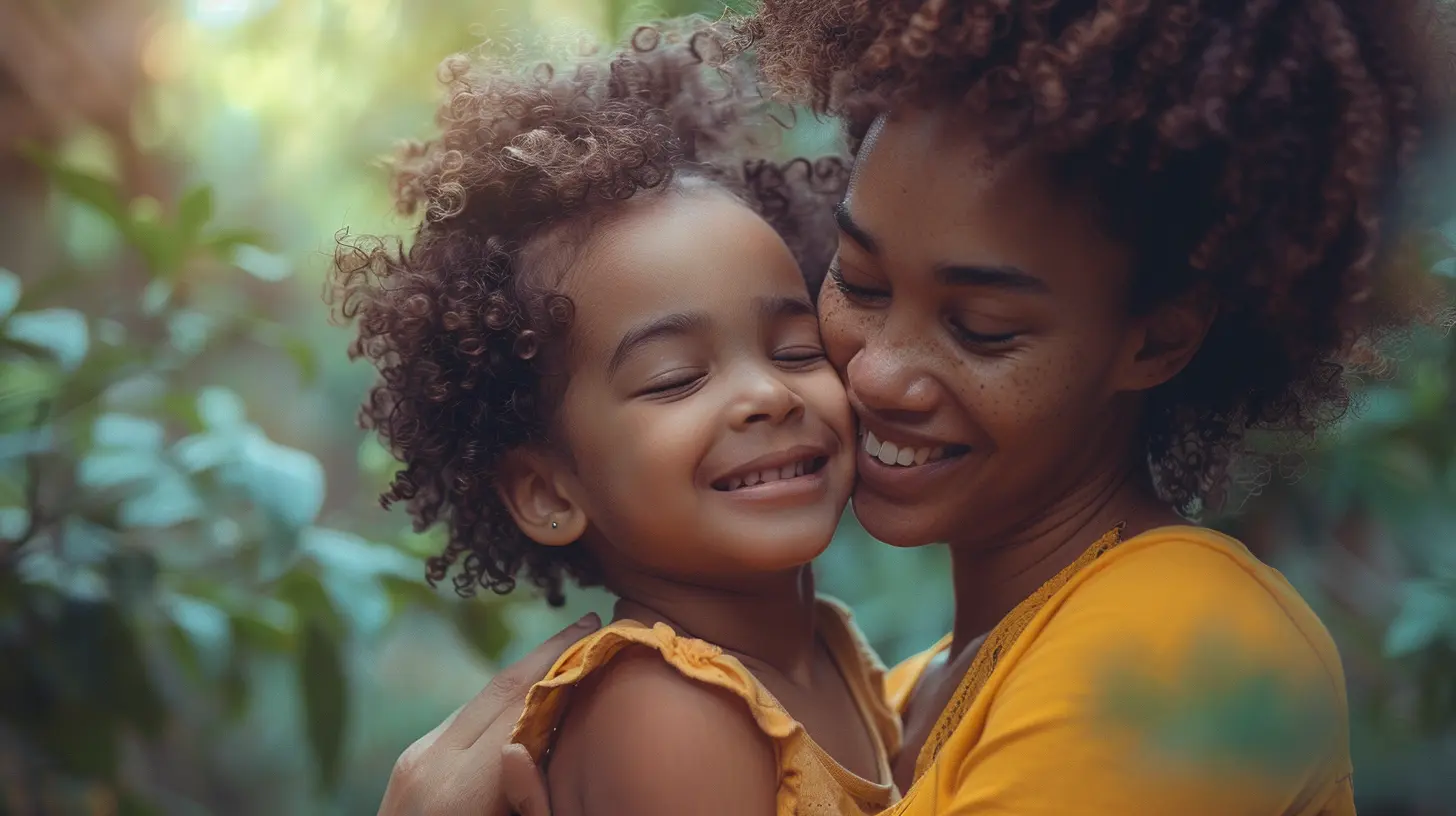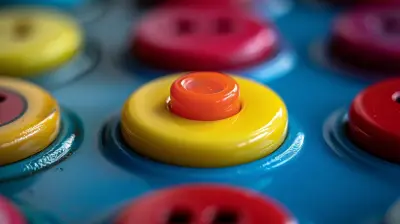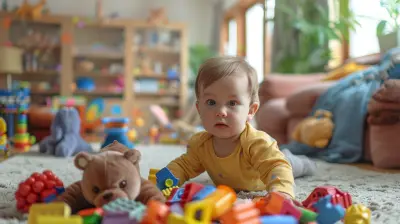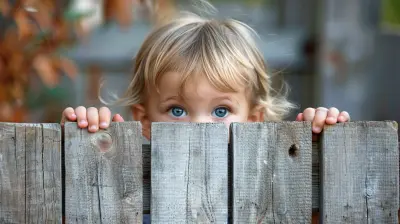Managing Big Emotions: Emotional Regulation Tips for Preschoolers
23 February 2025
Parenting a preschooler can feel like riding an emotional roller coaster. One minute they're laughing uncontrollably, and the next, they’re on the floor in full meltdown mode because their sandwich was cut into squares instead of triangles. Sound familiar? Preschoolers experience emotions just as intensely as adults—sometimes even more so—but they lack the tools and self-awareness to manage them. That’s where we, as parents, step in.
Helping your little one manage big emotions is one of the greatest gifts you can give them. It’s not just about surviving the tantrums, though that’s a definite bonus! Emotional regulation is a critical life skill that will serve them well into adulthood. So, let’s dive into some practical, doable tips for teaching your preschooler how to navigate those big emotions without it ending in tears (for either of you).
What Are “Big Emotions,” and Why Do Preschoolers Struggle With Them?
Preschoolers are a bundle of curiosity, creativity, and intense feelings. These "big emotions" could be happiness, frustration, sadness, anger, or even fear. While we, as adults, can usually pause, process, and respond to situations, preschoolers don’t have that luxury yet. Their brains are still developing, particularly the part responsible for self-control and reasoning (aka the prefrontal cortex).For your little one, everything feels urgent and overwhelming. They don’t understand why they can’t have another scoop of ice cream or why bedtime is non-negotiable. When their emotional cup overflows, they let it out—often loudly and dramatically. 
Why Emotional Regulation Matters
Here’s the thing: managing emotions doesn’t come naturally—it’s a learned skill. Emotional regulation helps kids:- Build stronger relationships with family and friends.
- Feel more confident in handling challenges.
- Develop problem-solving skills.
- Decrease anxiety and confusion in overwhelming situations.
Think of emotional regulation as a muscle: the more you work on it with your child, the stronger it gets. Let’s dive into how you can help them strengthen that muscle.
1. Create a Safe Space for Emotions
Have you ever been told to "calm down" when you’re upset? Yeah, it doesn’t help much—and it’s the same for kids. When your preschooler is feeling all the feels, they need to know it's okay. Let them know their emotions are valid, whether they’re feeling angry, scared, or frustrated. It's important to communicate, "It’s okay to feel upset. Everyone gets upset sometimes."A safe space doesn’t have to be a physical corner (though a cozy "calm-down corner" can help). It’s about creating an environment where your child knows they won’t be judged or punished for expressing their feelings. Once they feel secure, they’ll be more open to learning how to manage their emotions.
2. Validate Their Feelings
Imagine you’re venting to a friend, and their response is, “You’re overreacting.” Ouch, right? Now picture how a child feels when their meltdown is brushed off as "silly" or "not a big deal." Validation is key to emotional regulation.Instead of dismissing their feelings, try saying something like, "Wow, you’re really upset. I can see why you feel frustrated about not getting the toy you wanted." This simple acknowledgment helps them feel seen and understood—and sets the stage for teaching healthy coping strategies.
3. Teach Them the Language of Emotions
Ever had a day where you felt “off” but couldn’t really explain why? Preschoolers often feel the same way. They may be angry, sad, or frustrated but lack the words to express it. That’s where you come in!Teach your child to label their emotions. Start with the basics: happy, sad, angry, scared. Then, as they get the hang of it, you can introduce more nuanced terms like frustrated, anxious, or excited. Books about emotions or even drawing “emotion faces” can make this process fun and engaging.
4. Model Emotional Regulation
Let’s be real—kids are little sponges. They soak up everything we say and do, including how we handle our emotions. If you lose your cool every time you’re stuck in traffic, your child may assume that’s the way to handle frustration.Instead, model healthy emotional regulation. The next time you’re upset, say something like, “I’m feeling frustrated because I can’t find my keys. I’m going to take a deep breath and think about where I last saw them.” This shows your child that it’s okay to feel upset—and that there are productive ways to handle it.
5. Introduce Simple Coping Techniques
Preschoolers may not be ready for advanced mindfulness exercises, but they can definitely start learning some basic coping tools. Here are a few they’ll love:- Deep Breathing: Teach them to take “flower breaths.” Smell the flower (inhale through the nose), then blow out the candle (exhale through the mouth).
- Counting: Encourage counting to 10 when they’re upset. It gives them a moment to pause and collect themselves.
- Squeezing a Stress Ball: A squishy ball or stuffed animal can give them a physical outlet for their frustration.
- Hugging It Out: Hugs can work wonders—sometimes they’re the emotional “reset” kids need.
Pick one or two techniques and practice them regularly. You can even turn it into a game so they don’t feel like they're being “taught.”
6. Set Boundaries With Empathy
Managing your child’s big emotions doesn’t mean giving in to every demand. In fact, setting clear boundaries is a critical part of teaching emotional regulation. The key? Do it with empathy.For example, if your child is throwing a tantrum because they want a cookie before dinner, you can say, "I know you really want a cookie right now. It’s hard to wait, isn’t it? We’re going to have dinner first, and then you can have one." You’re holding firm on the rule while also showing understanding.
7. Use Books and Stories
Kids love stories, and they’re a fantastic way to teach emotional regulation. Look for books that feature characters experiencing and managing emotions. “The Color Monster” by Anna Llenas or “When Sophie Gets Angry—Really, Really Angry” by Molly Bang are great choices.As you read together, talk about the characters’ feelings. Ask, “How do you think they’re feeling? What do you think they’ll do next?” This encourages your child to think about emotions in a relatable (and non-threatening) way.
8. Practice Problem-Solving Together
Big emotions often stem from big problems—well, at least big in the eyes of a preschooler! Help your child navigate these scenarios by practicing problem-solving together.For example, if they're upset because their block tower keeps falling, work together to come up with solutions. Ask, “What can we do to make it stronger?” Guiding them through the process helps them feel more in control and teaches them how to tackle challenges in the future.
9. Create Routines and Predictability
Preschoolers thrive on routine. Knowing what to expect helps them feel safe and reduces the likelihood of emotional outbursts. Try to keep daily schedules consistent—meals, naps, and playtime at similar times each day.When changes do occur, give them a heads-up. For example, “We’re going to the doctor tomorrow morning, so we won’t have time for cartoons.” This helps them mentally prepare for the shift.
10. Be Patient With the Process
Teaching emotional regulation takes time—lots of it. There will be days when your preschooler surprises you with how well they handle a tough moment, and other days when it feels like nothing is sinking in. That’s normal.Remember, every meltdown is an opportunity to teach and connect. With your guidance, your child will gradually learn to understand and manage their emotions. Celebrate the small wins, and don’t forget to give yourself grace, too.
Conclusion
Preschoolers feel everything so deeply, and that’s both a challenge and a gift. While big emotions can sometimes feel overwhelming (for both you and your child), they’re also an opportunity to teach valuable life skills. By creating a safe space, modeling healthy emotional regulation, and practicing coping strategies together, you’re setting your child up for a lifetime of emotional resilience.So, take a deep breath, grab that “flower breath” technique, and remember—you’ve got this!
all images in this post were generated using AI tools
Category:
Parenting PreschoolersAuthor:

Max Shaffer
Discussion
rate this article
14 comments
Elidi Palmer
Absolutely loved this article! Navigating the wild world of preschooler emotions is like trying to herd cats—hilarious yet challenging! These tips are perfect for turning tantrums into teachable moments. Can’t wait to try them out at home! Keep 'em coming!
April 5, 2025 at 3:16 AM

Max Shaffer
Thank you so much for your kind words! I'm glad you found the tips helpful—wishing you lots of success in turning those tantrums into teachable moments!
Jocelyn McCaffrey
Every step matters in growth.
March 18, 2025 at 5:37 AM

Max Shaffer
Thank you! Every small step truly contributes to emotional growth in preschoolers.
Misty Lawrence
Oh sure, because teaching a tiny tornado to manage their emotions is exactly what I signed up for when I became a parent. I can’t wait to see how that goes between snack time and nap time!
March 14, 2025 at 4:47 PM

Max Shaffer
I totally understand! It can be a wild ride, but with patience and practice, those tiny tornadoes can learn to manage their emotions—even during snack and nap time!
London Bell
This article effectively highlights practical strategies for helping preschoolers navigate big emotions. By emphasizing the importance of modeling emotional regulation, utilizing simple language, and fostering a safe environment, parents can empower their children to understand and manage their feelings constructively.
March 14, 2025 at 4:45 AM

Max Shaffer
Thank you for your insightful comment! I'm glad you found the strategies useful for supporting preschoolers in managing their emotions.
Signe McGee
Navigating preschooler's big emotions is like managing a rollercoaster—full of ups and downs. Equip them with tools, and they'll not only ride the waves but also enjoy the thrill!
March 10, 2025 at 5:08 PM

Max Shaffer
Thank you! Embracing the emotional rollercoaster of preschoolers with the right tools can truly transform their experience. Your analogy captures this journey perfectly!
Stacey McCarthy
Great tips for parents!
March 10, 2025 at 4:49 AM

Max Shaffer
Thank you! I'm glad you found the tips helpful for parents navigating their preschoolers' emotions.
Maggie Mendez
What insightful tips! I'm eager to explore new ways to help my preschooler navigate their big emotions effectively.
March 4, 2025 at 3:24 PM

Max Shaffer
Thank you! I'm glad you found the tips helpful. Exploring emotional regulation together can be a wonderful journey for both you and your preschooler!
Kieran Horne
Great tips! Helping preschoolers navigate big emotions is crucial for their development and well-being. Thank you!
March 3, 2025 at 5:25 PM

Max Shaffer
Thank you! I'm glad you found the tips helpful for supporting preschoolers' emotional development.
Sophie McKay
Thank you for sharing these helpful tips! They are invaluable for guiding our little ones through their big emotions.
March 2, 2025 at 4:31 PM

Max Shaffer
Thank you for your kind words! I'm glad you found the tips helpful for supporting young children's emotional journeys.
Rusty McKellar
This article provides practical and relatable strategies for helping preschoolers navigate their big emotions. I appreciate the emphasis on patience and consistency, which are crucial for fostering emotional regulation in young children.
March 2, 2025 at 5:34 AM

Max Shaffer
Thank you for your thoughtful feedback! I'm glad you found the strategies helpful and agree on the importance of patience and consistency in supporting emotional regulation.
Sybil Barrett
Great tips! Remember, nurturing emotional regulation in preschoolers sets the foundation for their lifelong emotional health and resilience.
March 1, 2025 at 5:21 PM

Max Shaffer
Thank you! Absolutely, nurturing emotional regulation early on is crucial for lifelong resilience.
Everett Harris
Emotional regulation is a journey, not a destination! Every step you take helps your preschooler build resilience and understanding. Embrace the ups and downs; your support empowers their growth and teaches them the beauty of feeling and expressing emotions.
February 28, 2025 at 3:26 AM

Max Shaffer
Thank you for highlighting the importance of emotional regulation! Supporting our preschoolers through their emotional journey truly fosters resilience and understanding.
Sabina McManus
Great tips! Helping preschoolers manage emotions early sets a strong foundation for their emotional health.
February 27, 2025 at 5:44 PM

Max Shaffer
Thank you! I'm glad you found the tips helpful. Early emotional management is indeed crucial for healthy development!
Lyanna Hudson
Thank you for this invaluable guide! Navigating my preschooler's big emotions can be overwhelming, but your tips offer clarity and compassion. Together, we’re learning to understand and embrace these feelings.
February 24, 2025 at 3:53 AM

Max Shaffer
Thank you for your kind words! I'm glad you found the tips helpful in navigating those big emotions together. Keep up the great work!
MORE POSTS

How to Use Positive Language to Strengthen Your Parent-Child Connection

When Kids Push Your Buttons: Staying Calm During Challenging Moments

The Role of Chores in Teaching Kids to Appreciate Hard Work

The Challenge of Co-Parenting: Communicating Effectively for the Kids’ Sake

Why Self-Gratitude Matters: Helping Kids Appreciate Who They Are

Common Childproofing Mistakes Parents Make and How to Avoid Them

How Early Literacy Sets the Foundation for School Success

Toddlerhood and Boundaries: When They Start Testing the Limits

Parenting Through Transitions: How Attachment Parenting Supports Major Life Changes